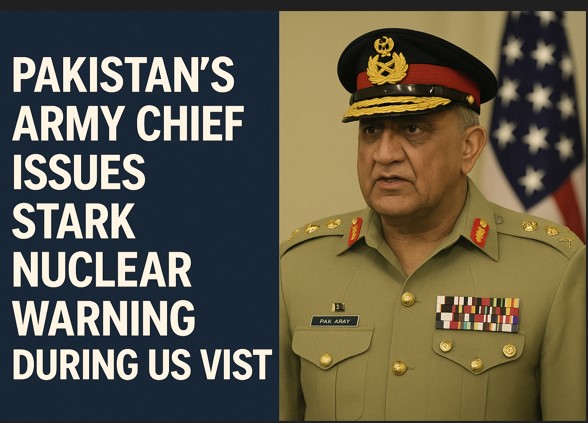US Trip Highlights Tensions: Asim Munir’s Controversial Statements Raise Global Concerns
In a shocking and unprecedented address delivered from Tampa, Florida, Pakistan’s Army Chief, General Asim Munir, has issued a stern warning regarding the potential for nuclear war. His remarks, which have sent ripples through diplomatic circles, suggest that Pakistan is prepared to escalate conflicts with India to catastrophic levels if it perceives an existential threat. This announcement marks a significant moment in international relations, as it was the first known instance where a nuclear threat aimed at a third country was made from US soil.
As outlined in reports from The Print, Munir stated, “We are a nuclear nation. If we think we are going down, we’ll take half the world down with us.” This declaration was made during a dinner hosted by Adnan Asad, a businessman and honorary consul for Tampa, who organized the event. The implications of Munir’s words are vast and concerning, given the complex geopolitical dynamics in South Asia.
Munir’s warning is a timely reminder of the escalating tensions in the subcontinent, particularly in the context of India-Pakistan relations. He directly addressed the potential consequences of India’s actions regarding the Indus Waters Treaty, a vital water-sharing agreement between the two nations, emphasizing that any hindrance to water accessibility for Pakistan could lead to severe repercussions. “We will wait for India to build a dam, and when it does so, phir 10 missile sey faarigh kar dengey,” he stated, indicating Pakistan’s readiness to respond with military force.
Who Are the Key Players?
General Asim Munir is the Chief of Army Staff of the Pakistan Army, a position he has held since November 2022. His tenure is characterized by significant military and political tensions, particularly between Pakistan and India. Munir’s threats are especially alarming in light of both nations’ nuclear capabilities and the long history of conflict that has marred their relationship since their independence in 1947.
The audience for this provocative speech included diplomatic representatives and the Pakistani diaspora in the U.S. Munir’s address comes at a time when U.S.-Pakistan relations are under scrutiny, particularly regarding military aid and counterterrorism cooperation. The recent upheavals in Afghanistan following the U.S. withdrawal could also serve as a backdrop for these tensions, complicating matters even further.
What Are the Implications?
The implications of Munir’s statements are profound. They signal a possible shift in Pakistan’s strategic posture, one that could escalate military confrontations. Such pronouncements about nuclear war add an alarming layer to the narrative; they indicate a willingness to engage in catastrophic warfare if national interests are threatened. The direct reference to “taking half the world down” underscores the gravity of his statements.
The context for Munir’s comments also includes India’s recent suspension of the Indus Waters Treaty due to security concerns raised after a terrorist attack in Pahalgam. This decision has aggravated tensions further, with Munir arguing that it risks the livelihoods of around 250 million people dependent on the Indus River system. His assertion that Pakistan possesses abundant missile capabilities hints at an extensive military preparedness that could be mobilized at a moment’s notice.
Where Are We Headed?
The geographic setting of these comments—made in the U.S.—is particularly revealing. It reflects an attempt by Pakistan to assert its stance on international platforms, signaling both defiance and urgency in the face of perceived threats. The U.S., often viewed as a mediator in South Asian conflicts, now faces a conundrum. Balancing relationships with both India and Pakistan places it in a delicate position, especially with the escalating rhetoric.
This is Munir’s second visit to the U.S. within months, and his prior interactions have included high-profile meetings, such as a luncheon with former President Donald Trump. During that meeting, he nominated Trump for a Nobel Prize, showcasing a blend of diplomacy and a push for recognition of Pakistan’s strategic role in counterterrorism efforts. These factors shape how the U.S. may respond to Munir’s latest proclamations.
When Did This Story Unfold?
The comments made by Munir came to light during a dinner event held recently in Florida. This visit is emblematic of the growing effort by Pakistan to engage with U.S. stakeholders, as tensions in South Asia continue to heighten. As per the report by The Print, this was not an isolated instance but rather part of a broader narrative of escalating concerns surrounding military actions, water security, and nuclear preparedness.
Why Are These Comments Significant?
The significance of Munir’s statements lies in their potential to alter the diplomatic landscape. With both Pakistan and India being nuclear-armed states, the threat of nuclear warfare is not to be taken lightly. The international community must be alert to the consequences arising from such inflammatory rhetoric, as it may provoke more aggressive military strategies.
Moreover, Munir’s remarks may serve to strengthen nationalistic sentiments within Pakistan, potentially positioning the Army as a protector of national interests amid growing dissent over domestic challenges. The perception of external threats can often consolidate political power, as seen historically in many nations.
Next Steps for Diplomacy
As global leaders digest the implications of General Munir’s statements, it is critical that diplomatic channels remain open. Efforts for mediation must be intensified to prevent escalation into open conflict. Engaging with both India and Pakistan on issues like the Indus Waters Treaty could be an essential step in de-escalating tensions and addressing core grievances that have persisted for decades.
The looming threat of nuclear confrontation necessitates a concerted approach from regional and global players to foster dialogue and promote peace. With the stakes incredibly high, the world watches closely as these unprecedented threats unfold.
For further reading on the geopolitical dynamics in South Asia, visit our articles on India-Pakistan Relations and Nuclear Deterrence in South Asia. Additionally, for comprehensive historical context, refer to[Council on Foreign Relations](https://www.cfr.org)۔


